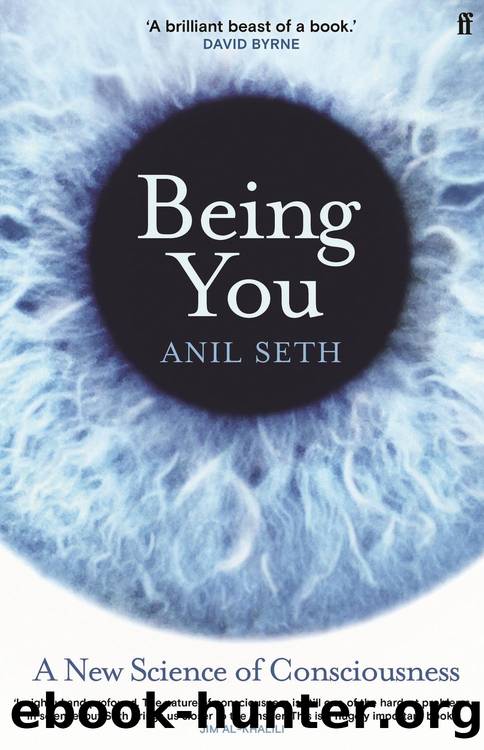Being You : A New Science of Consciousness (9780571337736) by Seth Anil

Author:Seth, Anil
Language: eng
Format: epub
Publisher: Faber & Faber Ltd
Published: 2021-09-15T00:00:00+00:00
The power of Clive and Deborahâs love for each other to restore Cliveâs sense of identity brings us to the âsocial selfâ.
Humans, like many other animals, are social creatures. Perceiving the state of mind of another is a crucial ability for social creatures in all sorts of contexts and in all manner of societies. This ability â sometimes called âtheory of mindâ â is often thought to develop rather slowly in humans, but it comes to play a key role for almost all of us throughout our lives.
At times we can be acutely aware of this, for example when we are worrying what a partner, friend, or colleague may be thinking about us. But even when we arenât ruminating on our social interactions, our ability to perceive othersâ intentions, beliefs, and desires is always operating in the background, guiding our behaviour and shaping our emotions.
There is a vast literature on social perception and theory of mind, encompassing psychology, sociology, and more recently the emerging field of social neuroscience. Much of this literature examines these topics in terms of their importance for guiding social interactions. Here, I want to turn the lens inwards, to consider how the experience of being me depends, in a substantial way, on how I perceive others perceiving me.
Social perception â perception of the mental states of others â is not just a matter of explicit reasoning or âthinking aboutâ what others may or may not be thinking. Much of our social perception is automatic and direct. We form perceptions of othersâ beliefs, emotions, and intentions as naturally and effortlessly as we form perceptions of cats and coffee cups and chairs and even of our own bodies. When I pour myself another glass of wine and I see my friend has moved her empty glass closer, thereâs no need for me to rationally figure out what her intention is; I simply perceive that sheâd like some more wine too, and that I shouldâve poured hers first. I perceive these mental states as effortlessly, though not necessarily as accurately, as I perceive the glass itself.
How does this happen? The answer, I think, lies again with the idea of the brain as a prediction machine, and with perception as a process of inferring the causes of sensory signals.
Both non-social and social perception involve the brain making best guesses about the causes of sensory inputs. Sometimes, as we all know, we can get things very wrong when perceiving whatâs in anotherâs mind, whereas we never confuse a wine glass with a car (unless we are hallucinating). One reason for the inherent ambiguity of social perception is that the relevant causes are more deeply hidden. The light waves that elicit perception of a wine glass originate more or less directly from the glass itself, but the sensory signals relevant to othersâ mental states must pass through a number of intermediate stages â through facial expressions, gestures, and speech acts â with each stage creating a new opportunity for an off-target inference.
Just
Download
This site does not store any files on its server. We only index and link to content provided by other sites. Please contact the content providers to delete copyright contents if any and email us, we'll remove relevant links or contents immediately.
The Art of Thinking Clearly by Rolf Dobelli(10454)
Mindhunter: Inside the FBI's Elite Serial Crime Unit by John E. Douglas & Mark Olshaker(9320)
Change Your Questions, Change Your Life by Marilee Adams(7759)
Nudge - Improving Decisions about Health, Wealth, and Happiness by Thaler Sunstein(7692)
Mastermind: How to Think Like Sherlock Holmes by Maria Konnikova(7323)
The Power of Now: A Guide to Spiritual Enlightenment by Eckhart Tolle(5752)
Men In Love by Nancy Friday(5234)
Altered Sensations by David Pantalony(5093)
Factfulness: Ten Reasons We're Wrong About the World – and Why Things Are Better Than You Think by Hans Rosling(4733)
The Confidence Code by Katty Kay(4251)
Thinking in Bets by Annie Duke(4218)
Man and His Symbols by Carl Gustav Jung(4130)
The Worm at the Core by Sheldon Solomon(3486)
Why Buddhism is True by Robert Wright(3446)
Liar's Poker by Michael Lewis(3441)
Three Women by Lisa Taddeo(3422)
The Inner Life of Animals by Peter Wohlleben(3310)
Descartes' Error by Antonio Damasio(3270)
How Music Works by David Byrne(3259)
